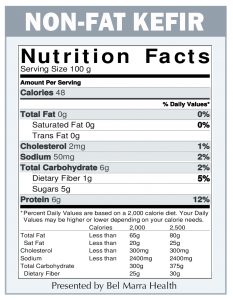 You can’t walk into a health food store without seeing promotional signs for probiotics. That’s because probiotics are considered one of the best things you can do for your digestion – right up there with stress relief and getting enough fiber and water to stay regular.
You can’t walk into a health food store without seeing promotional signs for probiotics. That’s because probiotics are considered one of the best things you can do for your digestion – right up there with stress relief and getting enough fiber and water to stay regular.
Probiotics are found in yogurt and kefir, another cultured milk product that’s getting a lot of attention. We’d like to talk about the extraordinary health benefits of kefir to encourage you to get this tangy drink into your diet, but let’s start with probiotics.
Advertisement
Probiotics are the live organisms, including healthy bacteria, which are naturally found in our digestive tracts. These organisms help stem the growth of harmful bacteria and boost our immune systems. Our gut has just as much a say in our overall outlook as our brain does, studies show, so keeping our digestion humming along makes us both healthy and happy.
On that happy note, we’ll introduce you to kefir (pronounced kee-fer), the fermented milk drink that originates from the Caucasus Mountains in Eastern Europe. The name has been traced to the Turkish word “keif” which means good feeling. Happy gut, happy feeling! The flavor, if you haven’t tried it, is naturally sweet and mildly tangy as well.
Nutritional value of kefir
 Kefir health benefits are many. Kefir is a rich source of calcium, protein and B vitamins. It packs more probiotics than even yogurt, because kefir is made by fermenting milk with 10 to 20 different types of bacteria and yeasts, where yogurt usually is fermented with a handful of types, giving kefir a higher probiotic count in the final product.
Kefir health benefits are many. Kefir is a rich source of calcium, protein and B vitamins. It packs more probiotics than even yogurt, because kefir is made by fermenting milk with 10 to 20 different types of bacteria and yeasts, where yogurt usually is fermented with a handful of types, giving kefir a higher probiotic count in the final product.
When you’re buying kefir, go with the plain version to avoid added sugars – then you can add your own pureed fruit for flavor at home. Have a look at the nutrition breakdown for nonfat kefir here.
How to make kefir at home
Milk kefir
Kefir is made from gelatinous white or yellow particles called “grains.” They aren’t an actual grain like wheat, but are made of bacteria and yeast, clumped together with casein (milk proteins) and complex sugars. They look like small clumps of cauliflower!
 The grains ferment the milk, incorporating their friendly organisms to create the cultured product. The grainy clumps are removed with a strainer before drinking.
The grains ferment the milk, incorporating their friendly organisms to create the cultured product. The grainy clumps are removed with a strainer before drinking.
How to do it yourself is easy
Add about a teaspoon of kefir grains to a cup of milk in a glass. Cover and let sit out at room temperature for about 24 hours. The bacteria and yeast in the kefir grains ferment the milk, preventing it from spoiling while turning it into kefir.
The grains work best with whole-fat animal milk, but if you’re looking for a non-dairy option, try coconut milk – also good!
When it’s done, the drink will have thickened to the consistency of buttermilk. Strain out the grains so you can use them in another batch, and your kefir is ready to drink to your health.
Water kefir
Water kefir, too, makes for refreshing good health. Basic water kefir is made by dropping a teaspoon of kefir grains into a cup of sugar water – water sweetened with cane sugar and molasses – and allowing it to ferment on the counter for a few days. Then strain and drink or keep in the refrigerator for later.
7 Top health benefits of kefir
 Let’s take a look at the benefits of kefir and why you should incorporate it into your diet:
Let’s take a look at the benefits of kefir and why you should incorporate it into your diet:
Improved digestion. Kefir can help re-establish a healthy bacterial balance in the digestive tract that may have been disrupted by poor diet, illness or medications.
Cholesterol control. Helps increase HDL “good” cholesterol and decrease the ratio of LDL “bad” to HDL cholesterol with long-term, daily intake. This may stem from the fatty acid distribution and the type of fats in the milk rather than the probiotics.
Helps with lactose intolerance. Kefir helps improve the digestion of lactose in people with lactose intolerance, when eaten in small doses over time. A study published in the Journal of the American Dietetic Association in 2003 found that kefir improved lactose digestion over milk, with reduced or no symptoms of lactose intolerance. The fermenting process changes some of the protein structures in the milk, making it easier to digest.
Get your B vitamins here. Kefir is a source of several B vitamins, which are essential for your blood and nervous system, including thiamine which is important for helping you combat stress. Kefir also contains biotin, a B vitamin that helps your body utilize other B vitamins effectively.
Boost calcium intake. Each 175-gram serving of kefir provides about 20 percent of the daily RDA for calcium, important for bones and teeth. Try replacing a regular dairy serving with kefir to get the calcium you need and the added probiotic benefits.
Advertisement
Increase phosphorus. The second most abundant mineral in our bodies, phosphorous is found in significant quantities in kefir. It helps us use carbohydrates and proteins for cell growth and energy. Who doesn’t want more energy?
Keep calm and carry on. Kefir contains tryptophan, an amino acid that can have a relaxing effect. Let the “good feeling” last and help manage your stress.
Are the health benefits of kefir quite extraordinary? Yes, we’d like to think so. Drink up!
